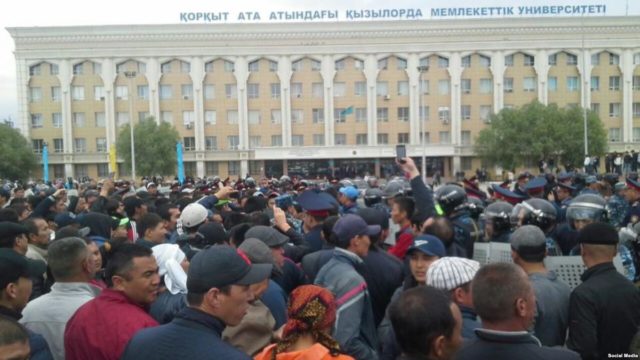 Following bloody clashes between ethnic Uyghurs and Han Chinese in the city of Urumchi, in Xinjiang Uighur Autonomous Region, in the summer of 2009, Beijing resorted to both carrot and stick policies to secure stability in this volatile territory.
Following bloody clashes between ethnic Uyghurs and Han Chinese in the city of Urumchi, in Xinjiang Uighur Autonomous Region, in the summer of 2009, Beijing resorted to both carrot and stick policies to secure stability in this volatile territory.
On the one hand, the central government is funneling massive funds to develop the local social infrastructure as well as promote minority ethnic cultures in Xinjiang, which borders on former Soviet Central Asia. But on the other, Beijing is stepping up political pressure on Muslims living there, under the guise of fighting religious extremism. Meanwhile, the continuing influx of Han Chinese from the inner provinces of China to Xinjiang fuels the fear of cultural and linguistic assimilation as well as the loss of ethnic identity among the region’s minorities—including Kazakhs. And Astana is increasingly being called upon by the Kazakh diaspora in China to intervene (see below).
According to official sources, between 1991 and 2016, more than 952,000 ethnic Kazakhs living abroad returned to Kazakhstan. But Kazakhs from China comprise only 14.2 percent of that number, compared to 61.6 percent from Uzbekistan (Diapazon.kz, January 26, 2017). Many observers attribute the significantly low percentage of ethnic-Kazakh “returnees” (or “oralmans” in official parlance) to draconian foreign travel regulations imposed by Beijing on ethnic Kazakhs and other minorities (Ratel.kz, December 7, 2017).
At a press-conference organized in late 2017 by the Social Democratic Party of Kazakhstan, Kazakhs from China who had been granted Kazakhstani citizenship expressed concerns about the fate of their relatives jailed in China. Kadirali Orazuly, a well-known public figure and human rights activist said that family members of ethnic Kazakhs who maintain contacts with relatives holding Kazakhstani passports were being subjected to judicial persecution in China and subsequently sent to so-called “Centers of Political Education” before being imprisoned after a short, closed trial. According to Orazuly, Chinese authorities use any pretext, from money transfers to telephone conversation or visits to relatives living in Kazakhstan, as evidence of wrongdoing with which to prosecute ethnic Kazakhs. Lyazzat Kamze, the head of the Center for Legal Assistance of the Social Democratic Party, said the persecution and imprisonment of ethnic Kazakhs in China in defiance of international law have assumed unprecedented proportions. Further, she called on rights activists to appeal to Kazakhstani Foreign Minister Kairat Abdrakhmanov and ask him to interfere (Ratel.kz, December 7, 2017).
Some of the emotionally charged stories of arbitrary behavior of Chinese authorities toward ethnic Kazakhs may be untrue. But increasing anti-Chinese sentiment among the domestic Kazakhstani population is hard to ignore. Public protests provoked by rumors about the government scheme to sell agricultural lands to foreigners, which shook West Kazakhstan in April and May 2016, were conspicuously accompanied by anti-Chinese slogans. The widespread suspicion and mistrust toward China is reinforced by cheap, low-quality Chinese goods flooding Kazakhstani markets as well as expanding activities of Chinese oil companies in West Kazakhstan, which are increasingly bringing in qualified workers from China but doing little to train local personnel or create jobs (see EDM, August 16, 2013; May 16, 2016).
The negative attitude toward China’s inter-ethnic policies was expressed at the Fifth World Congress of Kazakhs, held in Astana last June. The Congress was attended by delegates from 39 countries. During his remarks, Omirkhan Altyn, an ethnic Kazakh from Germany, spontaneously addressed Kazakhstan’s President Nursultan Nazarbayev to suggest that Chinese authorities, “in breach of their own and international laws on protection of human rights, were infringing the rights of ethnic Kazakhs.” According to Altyn, in some cases young Kazakhs in China appeared before the court simply for praying in mosques. President Nazarbayev, in turn, said he had never heard of Kazakhs being persecuted in China. But at the same time, he promised to “look into the matter through the Ministry of Foreign Affairs” (Ratel.kz, June 23, 2017).
Shortly after that, human rights activists collected signatures under the appeal, complete with lists of persons sent to the “Centers of Political Education” and handed copies of documents to the Ministry of Foreign Affairs of Kazakhstan as well as the Chinese embassy in Astana. The activists demanded that a commission be set up to investigate the situation. Simultaneously, several members of Kazakhstan’s parliament met with high-ranking Chinese government officials and handed them lists of jailed ethnic Kazakhs in China (Current Time TV, December 7, 2017). In response to charges that Kazakhs in China were being persecuted, the Chinese ambassador to Kazakhstan, Zhang Hanhui, claimed that during the days of the 19thCongress of the Chinese Communist Party, citizens in Xinjiang Uighur Autonomous Region were watched and searched irrespective of their ethnicity as part of security measures following information of possible plans to sow public disorder. He told Kazakhstani officials not to interfere in the internal affairs of China (Meta.kz, November 28).
The Jamestown Foundation, January 8, 2018




